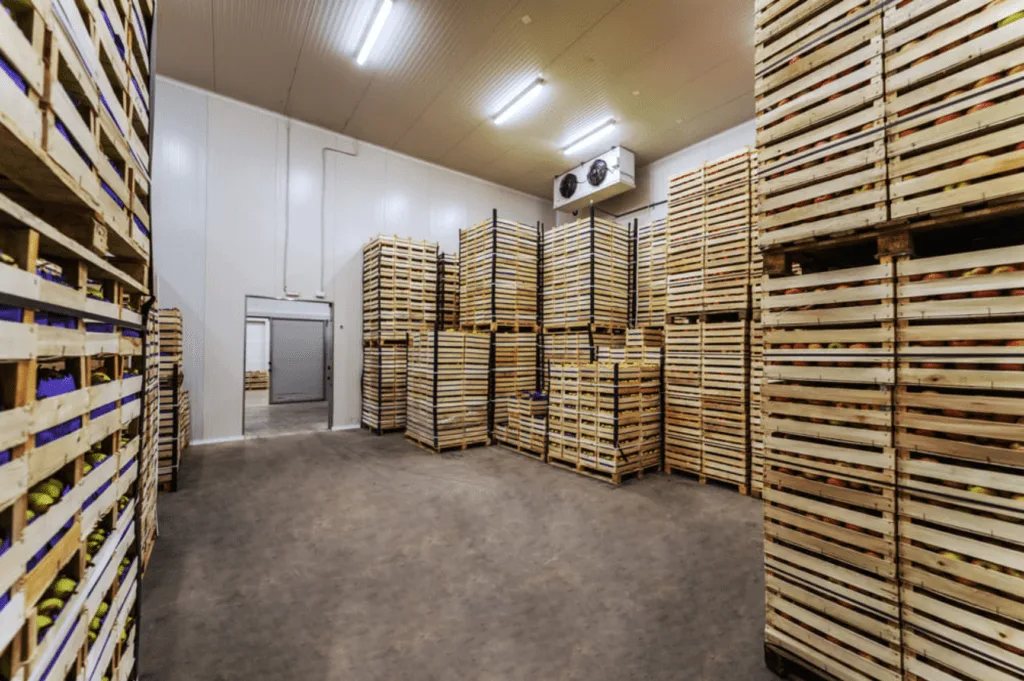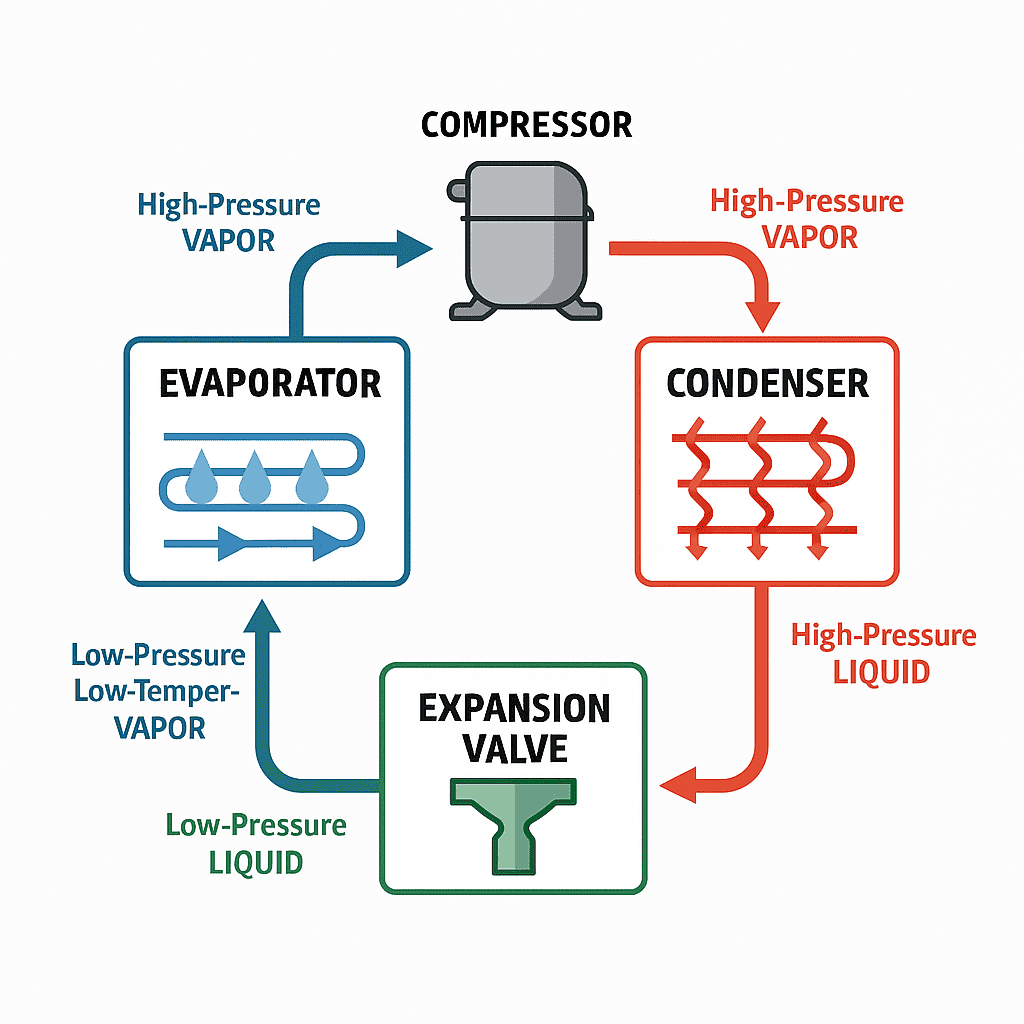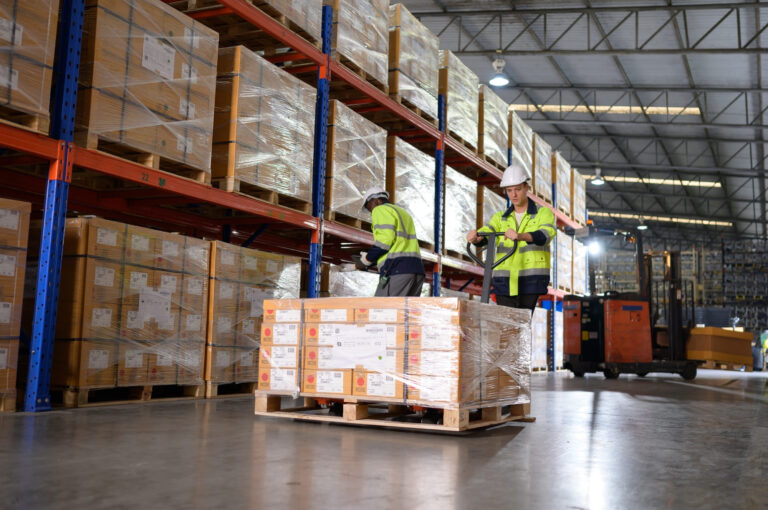What Is Cold Storage Warehousing? A Guide to Refrigerated & Freezer Warehouses

A cold storage warehouse (also called a refrigerated warehouse or cold storage facility) is a highly insulated, climate-controlled building that preserves temperature-sensitive products by maintaining precise low-temperature zones. These warehouses use industrial refrigeration (compressors, condensers, evaporators, etc.) to remove heat and lock in cold air, much like a giant commercial refrigerator. For example, chilled storage rooms may be kept at 2–8 °C for produce and dairy, while freezer rooms hold –18 °C or colder for meats and ice cream. By keeping products within their required temperature range, cold storage warehouses dramatically slow spoilage and bacteria growth, effectively extending shelf life and quality. This makes them essential for anything from fresh groceries to vaccines, where maintaining “cold chain” conditions ensures safety and compliance with food or drug regulations.
How Cold Storage Warehouses Work
The refrigeration equipment (such as condenser coils) in a cold storage warehouse forms a closed-loop cooling system. Refrigerant (coolant) circulates through compressors, condensers, and evaporators to remove heat and lower temperatures inside the facility. In practice, compressors raise the refrigerant’s pressure, the condensers (shown above) expel heat to the outside, and evaporators pump chilled air into the storage areas. This engineering ensures products remain at the target temperature (whether a 2–8°C chilled zone or a subzero freezer room).

Types of Cold Storage Warehouses
Different cold storage solutions are tailored to various products and industries:
- Refrigerated (Chill) Warehouse: Keep goods just above freezing (typically 2–8 °C). Ideal for fresh produce, dairy, beverages, and other perishables that need to stay cool but not frozen
- Frozen (Freezer) Warehouse: Keeps goods below 32 °F (often –18 °C or colder) for frozen foods such as meats, seafood, and ice cream.
- Ultra-Low Temperature (ULT) Cold Storage: Specialized warehouses for extreme cold (down to –122.8 °F) used for vaccines, biologics, and sensitive research materials.
- Blast Chillers / Shock Freezers: Facilities that rapidly freeze products (e.g., baked goods or meats straight from production) to preserve texture and safety before longer-term storage.
- Controlled Atmosphere Warehouses: Enclosed spaces that regulate not only temperature but also oxygen, carbon dioxide, and humidity (ideal for certain fruits and vegetables).
- Multi-Temperature Warehouses: Facilities with different zones (e.g., chilled, frozen, and ambient) under one roof, allowing diverse products to be stored at their optimal conditions.
- Public vs. Private Cold Storage: Private cold warehouses are owned by a single company for its own products. In contrast, public cold storage is operated by third-party logistics providers (cold storage companies) that serve multiple clients – receiving, storing, and shipping goods on their behalf.
- Automated Cold Storage: Modern warehouses increasingly use robotics, automated storage/retrieval systems, and IoT sensors for efficient inventory management and monitoring in cold environments.
Products and Industries Served
Cold storage warehouses serve virtually any industry with perishable or temperature-sensitive goods. Common examples include:
- Food & Beverage: Fresh produce, fruits and vegetables, meat and poultry, seafood, dairy products (milk, cheese, yogurt), frozen foods (ready meals, ice cream, frozen vegetables), beverages. These products rely on cold storage at various stages of the supply chain.
- Pharmaceuticals & Biotech: Vaccines, biologics, blood products, and temperature-sensitive medications must be kept at precise temperatures to remain effective. Many biotech and medical products (like insulin or certain cancer drugs) require refrigerated or even ultra-cold storage.
- Agriculture & Floral: Cut flowers, seeds, and fresh plants use cold storage to preserve freshness during transport. Cold chains in agriculture (e.g., for greenhouse produce) prevent wilting and spoilage.
- Cosmetics & Chemicals: Certain cosmetics, lotions, and chemical reagents can degrade in heat, so manufacturers often store them chilled. High-value goods like fine wines, artwork, or film negatives may also be kept in climate-controlled cold storage to prevent damage.
- Specialty Goods: Items such as fine wines, film negatives, electronics components, or historical documents that can be damaged by heat may be kept in cold warehouses.
- Logistics & Retail: Restaurants, grocery stores, and food-service companies rely on cold warehouses to stock inventory. Food processors, importers/exporters, and e-commerce grocers all use third-party cold storage to manage their supply chains. In essence, any sector dealing with perishables (food, pharma, floral, etc.) depends heavily on cold storage warehousing.
Benefits of Cold Storage Warehousing
Using a cold warehouse offers several advantages for businesses handling perishables:
- Extended Shelf Life: Maintaining optimal cold temperatures slows spoilage and bacterial growth, keeping products safe and fresh for longer.
- Reduced Waste and Costs: Less spoilage means lower product losses and more predictable inventory costs over time.
- Regulatory Compliance & Safety: Cold storage helps businesses meet food safety and pharmaceutical regulations by ensuring required handling and storage conditions.
- Flexible Inventory Management: Third-party cold warehouses let companies stock extra seasonal or promotional inventory without expanding their own facilities. Advanced tracking (RFID/barcode) supports first-in/first-out (FIFO) management to minimize waste.
- Integrated Distribution: Many cold storage providers also offer logistics services (cross-docking, consolidation, transportation), streamlining supply chains. Facilities located near transit hubs (highways, ports, airports) reduce delivery times and costs.
- Scalability: Partnering with cold storage companies allows rapid scaling of space to meet demand spikes or market expansion, without the capital expense of building new warehouses.
The Growth and Importance of the Cold Storage Industry
The cold storage sector is no longer just a niche corner of warehousing—it’s now a major force in industrial logistics and real estate. In the U.S. alone, cold storage space covered over 3.6 billion cubic feet in 2017, and the U.S. cold storage market size was valued at USD 135.83 billion by 2033, growing at a CAGR of 13.8% from 2025 to 2033. Key states like California, Washington, and Florida lead in cold storage capacity due to their agricultural and distribution hubs.
Trends Driving Cold Storage Growth
Recent industry trends include:
- Changing Consumer Demand: A shift toward fresh, minimally processed foods and online meal kits is increasing demand for temperature-controlled logistics.
- Population and Global Growth: With the U.S. population expected to increase by more than 20 million by 2026, the demand for food, medication, and refrigerated consumer goods continues to surge—driving the need for expanded cold storage infrastructure.
- Refrigerated Transportation Logistics that maintain proper temperatures throughout shipping
- E-Commerce Expansion: Conger Industries observes that “the rise of E-commerce has led to more online shoppers who buy things that require cold storage,” such as groceries and frozen meals.
- Automation & Technology: Warehouses are adopting robots, automated cranes, and IoT monitoring to improve efficiency and accuracy in cold environments.
- Energy Efficiency: Operators invest in green tech (solar, efficient refrigeration, high-performance insulation) to cut energy use and emissions.
- Cold Chain Integration: End-to-end cold logistics solutions (from cold storage to refrigerated trucking) are becoming more common, ensuring product integrity throughout delivery.
- Pharma & Biotech Focus: Ultra-low temperature storage for vaccines and research has grown rapidly, especially following COVID-19, expanding this niche segment of the cold storage market.
Choosing the Right Cold Storage Warehouse
Key considerations when choosing a cold storage partner include:
- Location & Accessibility: Facilities should be near your production sites or customers and close to transportation modes (major roads, rail, airports) to minimize transit delays and costs.
- Capacity & Configuration: Ensure the warehouse has enough space (square footage and ceiling height) and the right temperature zones (chilled vs. frozen) for your products.
- Inventory Technology: Best-in-class cold warehouses use advanced tracking (RFID, barcode) for real-time visibility and efficient stock rotation.
- Reliable Infrastructure: Look for backup generators and redundant systems to keep freezers running during power outages. Efficient, well-maintained refrigeration equipment is essential.
- Security & Compliance: Warehouses should have strict access controls, sanitation protocols, and relevant certifications (e.g., FDA, HACCP, GDP) to protect product integrity.
- Value-Added Services: Some providers offer blast freezing, repackaging, kitting, and cross-docking services that can streamline your operations.
- Provider Experience: Work with established cold storage logistics companies that specialize in your industry. Outsourcing to a 3PL cold warehouse can improve quality control and let you focus on core business.
Partnering with OLIMP for Cold Storage
When your business needs reliable cold storage and distribution, OLIMP Warehousing is ready to help. OLIMP connects clients with a nationwide network of temperature-controlled warehouses across the US, Canada, and Mexico—covering both refrigerated and frozen storage solutions. Their partners offer comprehensive cold-chain services (blast freezing, automated storage, advanced inventory systems) to keep your products safe and your operations efficient.
OLIMP’s warehouse network is strategically located near transportation hubs and distribution centers, ensuring fast access and seamless logistics. Whether you need short-term flexibility or long-term capacity, OLIMP’s experts will match you with the right facility and services. Contact OLIMP today to request a quote and secure the optimal cold storage warehousing solution for your supply chain.
Frequently Asked Questions (FAQ) – OLIMP Warehousing
Q: What is a cold storage warehouse?
A cold storage warehouse (also called a refrigerated warehouse or freezer warehouse) is a climate-controlled facility designed to store perishable or temperature-sensitive products at set cold temperatures. It uses insulated walls and industrial refrigeration systems to keep goods like fresh foods or medicines at specific temperatures, extending their shelf life and preventing spoilage.
Q: What is the difference between a refrigerated warehouse and a freezer warehouse?
A refrigerated (chilled) warehouse maintains temperatures above freezing, typically around 2–8 °C, for items like produce and dairy. A freezer (frozen) warehouse keeps temperatures below 0 °C (often –18 °C or colder) for fully frozen goods such as meats, seafood and ice cream. The key difference is simply the temperature range: one stores items chilled but unfrozen, the other keeps them fully frozen.
Q: What products are commonly stored in cold storage facilities?
Typical items include perishable foods (fruits, vegetables, meats, seafood, dairy, frozen meals), pharmaceuticals and biologics (vaccines, medicines, blood products), floral products (cut flowers, seeds), and even sensitive materials like certain chemicals or electronics. In short, any product that must stay at a certain temperature—food, medicine, biotech, etc.—will use cold storage.
Q: What are the benefits of using a cold storage warehouse?
Cold storage enables businesses to extend shelf life and reduce spoilage by keeping products in ideal conditions. This leads to less waste and more predictable inventory costs. It also ensures compliance with safety regulations for food and drugs. Additionally, third-party cold warehouses allow companies to stock up for peak seasons without building new warehouses, offering flexibility and scalability. Integrated services (like refrigerated transport and cross-docking) can further streamline the supply chain.
Q: How do I choose the right cold storage warehouse?
Look for a facility close to your supply chain network (production sites, customers, transport hubs) to minimize transit risks. Ensure it has sufficient size and the correct temperature zones for your products. Ask about reliability: does it have backup power and high-quality refrigeration systems? Check that they use advanced inventory systems for traceability. Also verify certifications (e.g. FDA/HACCP for food). Finally, consider any extra services offered (like blast freezing or inventory kitting) that might add value.
Q: How cold are cold storage warehouses typically?
Chilled storage areas are generally kept just above freezing (around 2–8 °C). Standard freezer zones are usually maintained between –18 °C and –25 °C. Ultra-cold storage (for biotech or vaccine products) can drop below –70 °C. The exact setpoint depends on the goods: for example, fresh produce often stores at ~4 °C, while frozen meals stay at –18 °C or lower.
You may be interested in

Complete Guide to Dry Warehouse Storage and Dry Goods Shipping (2025 Update)
In today’s fast‑moving supply chains, ambient storage plays an essential role in keeping non‑perishable products safe, organized and ready for distribution. Dry warehouse storage refers to facilities that keep goods at room temperature and protect them from moisture, pests and contamination. Unlike cold storage, which relies on refrigeration or freezing, dry warehouses provide clean, climate‑stable […]

Public Warehouse: A Comprehensive Guide
Public warehouses are third-party storage facilities where multiple companies can rent space and services on a flexible basis. In other words, a public warehouse (or public warehousing facility) is a large, multi-client warehouse owned by an independent provider, not by a single company. Businesses facing seasonal surges or fluctuating inventory needs often use public warehousing […]

Shared Warehouse Space: What It Is, Who It’s For, and How to Pick One
Shared or co-warehousing spaces let multiple brands fulfill orders under one roof. Instead of leasing an entire warehouse, each client rents only the space and services it needs. Think of it as “coworking for logistics”: each company keeps its own inventory, but shares the facility’s racks, equipment, staff and management systems with others. This split-model […]
Ready to streamline your warehousing needs?
Request a quote today and discover how OLIMP's tailored solutions can optimize your operations